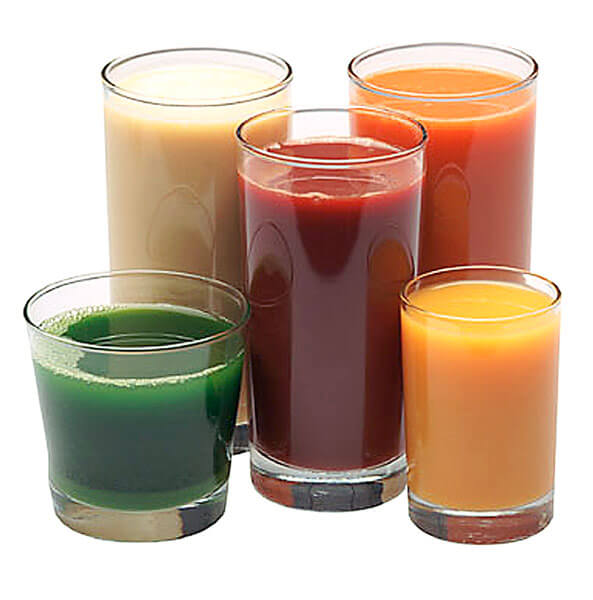
Complete Juicing Nutrition
Many people have gone on juice fasts to help flush their system of toxins. While juicing is great for your body, I’m actually against it.
That last statement may sound a bit shocking, but let me explain. Juicing is good for you and provides many nutrients, but the process discards the skin and pulp of produce. These juicing waste products contain fiber and other necessary nutrients.
That being said, I think smoothies or complete juicing provides much better nutrition.
If you want to cleanse your body, become healthier and lose unnecessary weight, then read on. Below are some basic guidelines and recipes for a complete juicing/smoothie cleanse.
What to use
- Spinach– Because it’s high in so many nutrients, including iron, this is an ideal ingredient for vegetarians or those who are anemic. Spinach is also a good source of Niacin, Zinc, Dietary Fiber, Protein, Vitamin A, Vitamin C, Vitamin E (Alpha Tocopherol), Vitamin K, Thiamin, Riboflavin, Vitamin B6, Folate, Calcium, Iron, Magnesium, Phosphorus, Potassium, Copper and Manganese.
- Beets– Also high in iron, this is a great energy booster. Beets are also high in Protein, Vitamin C, Fiber, Magnesium, Folate, Potassium and Manganese. Because beets are naturally high in sugars as well, they won’t add such a bitter taste to your smoothie.
- Barley Grass– Like wheat grass, barley grass is developed by a sprouting process. In the sprout form, barley grass is high in chlorophyll. It’s also a more effective antioxidant than wheat grass and might be an anti inflammatory. It’s high in B vitamins, beta carotene, folic acid and calcium. (data taken from Starwest-Botanicals.com).
- Flaxseed oil– The highest natural source for ALA, an essential Omega-3 fatty acid that converts into DHA and EPA in the human body. This is an anti inflammatory and healthy for your heart and cells. (data taken from spectrumorganics.com).
- Flaxseed– High in soluble and insoluble fiber, this seed has many health benefits. Similar to the benefits of flaxseed oil, flaxseed helps with cancer, diabetes, stroke and heart disease. Studies have shown that the ALA fatty acid inhibited cancerous tumor growth. It’s an antioxidant that contains up to 800 times more lignans than other plants.(data taken from webmd.com).
- Spirulina powder– Higher in protein than soy, this powerhouse nutrient also contains 9 essential amino acids and 9 nonessential amino acids. The blue-green algae also contains dozens of vitamins, minerals and phytonutrients. (data taken from spirulina.com).
- Avocado – These add a delicious creaminess to the smoothie, without a strong veggie flavor. They’re also full of healthy fats, folate and vitamins A and K, among other things.
What NOT To Use
- Sugar– Processed sugar provides no health benefits whatsoever and depletes the body of B vitamins and adversely affects the nervous system. Even “raw” sugar isn’t as raw as it’s touted to be. It’s actually illegal to sell sugar that isn’t refined to some extent, so completely raw sugar is not available for purchase. According to PETA and other sources, charred bones are used to whiten the sugar.
- Protein Powder – Most protein powders are highly processed and are soy or milk based. While I’m all for raw milk, or even organic store bought in a pinch, this highly processed ingredient has been stripped of its nutrition.(source) Excess protein is hard on the kidneys. I like to stick to bioavailable nutrient dense sources, like this eggnog that helps remineralize teeth.
- Agave nectar– This “natural” sweetener is deceptively bad for you. The name infers that the product is the nectar of the agave plant, when in fact it’s actually a chemically refined starch. Similar to high fructose corn syrup, agave has about a 20% higher fructose content.
Strawberry Energy
- 1 1/2 cups frozen strawberries
- 1/2 cup raw beet (about 1 small beet or 1/2 a large one)
- 1/2 cup fresh spinach leaves
- 1/2 avocado
- 1-2 Tbsp Flax seed or coconut oil
- Orange juice (add until desired consistency)
Get FREE access to my newsletter, exclusive coupon codes, and links to my recommended natural living products!
Get FREE access to my newsletter, exclusive coupon codes, and links to my recommended natural living products!